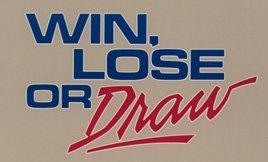
Hollywood Squares is an American game show in which two contestants compete in a game of tic-tac-toe to win cash and prizes. The show piloted on NBC in 1965 and the regular series debuted in 1966 on the same network. The board for the game is a 3 × 3 vertical stack of open-faced cubes, each occupied by a celebrity seated at a desk and facing the contestants. The stars are asked questions by the host and the contestants judge the truth of their answers to gain squares in the right pattern to win the game.

Finders Keepers is an American children's game show that debuted on Nickelodeon in 1987 and later aired in first-run syndication starting in 1988. The show featured two teams of two children attempting to find hidden objects in different rooms of a house.

Beat the Clock is an American television game show that involves people trying to complete challenges to win prizes while faced with a time limit. The show was a creation of Mark Goodson-Bill Todman Productions.

Win, Lose or Draw is an American television game show that aired from 1987 to 1990 in syndication and on NBC. It was taped at CBS Television City, often in Studios 31, 33, and 43 at various times. It was co-produced by Burt & Bert Productions and Kline & Friends for Disney's Buena Vista Television. It has also had two versions on The Disney Channel: Teen Win, Lose or Draw from 1989 to 1992, and a revived version known as Disney's Win, Lose or Draw which aired in 2014. New York described Win, Lose or Draw as "a knockoff" of the board game Pictionary, however, Burt Reynolds and Ed McMahon referred to playing the game at Burt's home during the August 2, 1978 episode of The Tonight Show, with Johnny Carson, three years before Pictionary was created.
The Joker's Wild is an American television game show that aired at different times between 1972 and 2019. In the show, contestants answer questions based on categories determined randomly by a mechanism resembling a slot machine. The show's title refers to the game's slot-machine mechanism also having jokers.

The Cross-Wits is an American syndicated game show which premiered on December 15, 1975, and lasted for five seasons until its cancellation on September 12, 1980. The show was hosted by Jack Clark, with Jerri Fiala as hostess. Announcing duties were handled by John Harlan, Jay Stewart, and Jerry Bishop. The show was produced by Ralph Edwards Productions and distributed by Metromedia Producers Corporation.

Think Fast is an American children's game show which aired on Nickelodeon from May 1, 1989, to March 30, 1990, with reruns airing weekly until June 29, 1991.

Fun House is an American children's television game show that aired from September 5, 1988 to April 13, 1991. The first two seasons aired in daily syndication, with the Fox network picking it up and renaming it Fox's Fun House for its third and final season.

Tic-Tac-Dough is an American television game show based on the paper-and-pencil game of tic-tac-toe. Contestants answer questions in various categories to put up their respective symbol, X or O, on the board. Three versions were produced: the initial 1956–59 run on NBC, a 1978–86 run initially on CBS and then in syndication, and a syndicated run in 1990. The show was produced by Barry & Enright Productions.

Shop 'til You Drop is an American game show that was on the air intermittently between 1991 and 2005. Four different series were produced during that time, with the first premiering on Lifetime on July 8, 1991, and the fourth series airing its final episode on May 27, 2005, on PAX TV.

Shopping Spree is a game show that aired on the Family Channel for two seasons from September 30, 1996, to December 26, 1997, with reruns airing until August 14, 1998. Two teams of two unacquainted players went on a shopping spree at six stores, each with four prizes, on a fictional street on stage. The object of the game was to match the desired prizes with visual clues given by the contestant in the quickest amount of time. The show was hosted by Ron Pearson, announced by Burton Richardson and produced by Jay Wolpert Enterprises and MTM Enterprises.

Treasure Hunt, also known as The New Treasure Hunt during its 1970s run, is an American television game show that aired throughout the 1950s, 1970s, and 1980s. In the show, contestants selected a mystery package in the hopes of winning cash or prizes.
Slime Time is a syndicated game show, running on Saturdays from June 11 to September 3, 1988. It was created to cash in on the success of Double Dare, and was very similar to that show. The host was comedian Marty Cohen, who hosted each episode dressed as a referee and the show was announced by Dean Goss.

Break the Bank is an American game show created by Jack Barry and Dan Enright and produced by their production company, Barry & Enright Productions. It was the first game show packaged by Barry and Enright as a tandem since their fall from grace following the 1950s quiz show scandals.

PlayCafe was an interactive Internet game show network which billed itself as "the first online game show network." PlayCafe was founded in April 2007 by Dev Nag and Mark Goldenson, funded by angel investors. PlayCafe produced over 300 hour-long episodes, which were broadcast live from Redwood City, California and hosted by Daniella Martin from August 2007 to August 7, 2008, then by Chad Mosher in Flint, Michigan from August 14, 2008 to December 18, 2008.

BrainSurge is an American children's game show that aired on Nickelodeon and was hosted by Jeff Sutphen. The show taped its first season in February 2009, and debuted on September 28, 2009. The show's format was adapted from the Japanese game show Brain Survivor. The U.S. version was created by Scott A. Stone, co-creator of Legends of the Hidden Temple, and Clay Newbill, executive producer of The Mole.
Nickelodeon All-Star Challenge is a three-episode game show television special that aired during The Big Help on October 3, 1994.
Family Game Night is an American television game show based on Hasbro's family of board games and EA's video game franchise of the same name. The show was hosted by Todd Newton. Burton Richardson was the announcer for the first two seasons; he was replaced by Stacey J. Aswad in the third season, and Andrew Kishino was hired for the fourth season. The 60-minute program debuted on October 10, 2010, on The Hub ; it was previewed on October 9, 2010, on its sister channel, TLC. Seasons 1 and 2 contained 26 and 30 episodes respectively. Seasons 3, 4 and 5 each contained 15 episodes. Season 2 premiered on Friday, September 2, 2011, with additional games being added. The games added to the second season included Cranium Brain Breaks, Green Scream, Ratuki Go-Round, Simon Flash, Operation Sam Dunk, Trouble Pop Quiz, and Spelling Bee. However games from the previous season were still kept.

Fort Boyard: Ultimate Challenge is a children's game show, based on the French show Fort Boyard, which aired on both CITV and Disney XD. The show is a challenge game where six different "fearless" teams of teenagers battle-to-the-finish to win the "Ultimate Challenge" and become the "Ultimate Conquerors Of The Fort". The show is a revived and updated version of the original format, broadcast in the UK from 1998 to 2003.

All Star Shore is an American reality competition television series that premiered on June 29, 2022. It is a successor to Jersey Shore that features television stars from around the world as they live together in a villa and compete in party-style challenges for $150,000.














